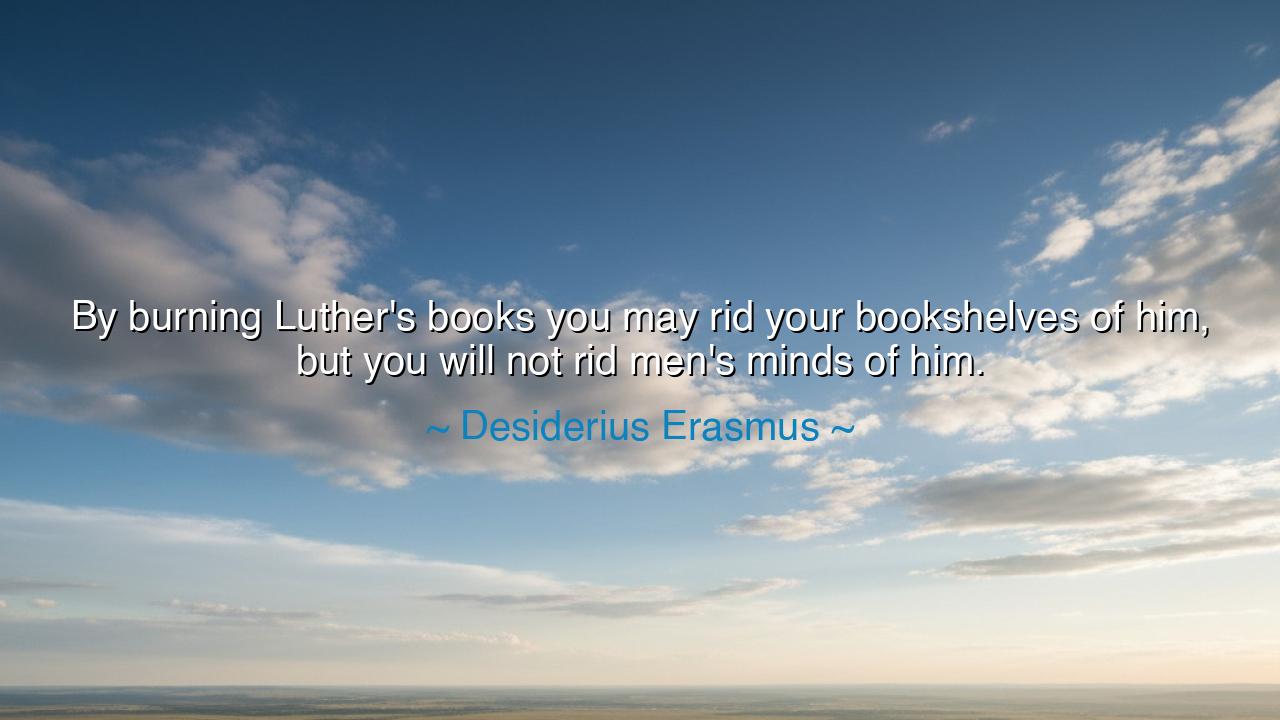
By burning Luther's books you may rid your bookshelves of him
By burning Luther's books you may rid your bookshelves of him, but you will not rid men's minds of him.






Hear well, O children of the future, for the words of Desiderius Erasmus carry a wisdom as eternal as the truths he sought to preserve. He once said, “By burning Luther’s books you may rid your bookshelves of him, but you will not rid men’s minds of him.” These words are a warning to those who seek to silence ideas through force, through destruction, through the burning of the written word. It is a lesson, not just about the power of thought, but about the resilience of ideas in the face of persecution.
Throughout the ages, ideas have been like seeds carried on the wind—some fall on fertile ground, others on barren rock, but all carry within them the potential to change the world. The burning of books, an act of destruction meant to erase knowledge, has never been a weapon that can defeat the power of truth. For though the physical copies of a book may burn, the ideas within them can never be extinguished. Luther's books, filled with the revolutionary ideas of the Reformation, were not merely words written on paper, but were sparks of a fire that would spread beyond the reach of the flames.
Consider, if you will, the fate of the philosophers of ancient Greece—minds like Socrates, whose ideas were deemed dangerous by the rulers of his time. Though his teachings were condemned, though he was sentenced to death, his words did not vanish into silence. His ideas lived on, passed down through generations, preserved by those who knew that truth cannot be killed by the sword or by fire. Socrates' death did not end his influence; it only solidified it, for in the crucible of his suffering, his message grew stronger. Erasmus, too, understood this profound truth—that while the physical body may perish, the ideas that shape humanity are immortal.
The story of Martin Luther, whose 95 theses sparked the Protestant Reformation, is another example of the power of thought to survive even the fiercest opposition. Luther's writings were burned, his followers excommunicated, but his ideas spread like wildfire, fanning the flames of change across Europe. The Catholic Church, in its effort to suppress Luther's radical thoughts, only served to amplify them. Erasmus, who lived during this time, saw this unfolding drama with great clarity. He knew that no amount of destruction could erase the truth once it had taken root in the minds of men. Ideas are the true inheritors of the earth, and they cannot be bound by the limitations of time or space.
Thus, Erasmus teaches us that oppression, whether through the burning of books or the silencing of voices, is an act not of victory but of fear. It is the fear that the truth will take root, that once a seed is planted in the mind, it will grow into something far more powerful than any empire, any army, or any king. The revolutionary ideas that sparked the Reformation could not be stifled by the flames, for they were not confined to the pages of books; they lived in the hearts of men and women, spreading from mouth to mouth, from mind to mind.
So, O children of the future, take this lesson with you: do not seek to silence the truth with force. No matter how much power you hold, you cannot burn away the ideas that live within the hearts of the people. Truth, once spoken, once believed, cannot be erased by fire or by decree. Instead, seek to understand, to listen, and to debate, for only through the exchange of ideas does wisdom grow. Remember that every idea—whether it is one of peace or one of change—has the potential to transform the world. Do not fear the ideas of others, for the truth cannot be destroyed. It will live on, carried by the minds of those who dare to think, to question, and to speak.
Thus, the call to action is clear: protect the freedom of thought, for it is through thought that the world is shaped. Do not seek to silence others, but to engage with them, to challenge their ideas and to have your own challenged. Ideas are the foundation of progress, and no force in this world—be it fire, war, or oppression—can ever extinguish them. As you walk through the world, remember that the truth you hold is like a flame. Share it with others, and let its light guide you toward a future where the freedom of thought is celebrated, not feared.






AAdministratorAdministrator
Welcome, honored guests. Please leave a comment, we will respond soon